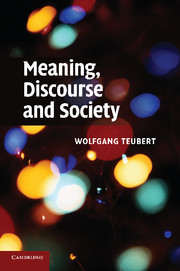Book contents
- Frontmatter
- Contents
- Acknowledgements
- Introduction
- Part I Meaning, the mind and the brain
- 1 The cognitive turn
- 2 The long history of mind linguistics
- 3 What do we know about mental concepts?
- 4 Morphing theoretical sémes into ‘real’ concepts
- 5 From mental representations to conceptual ontologies
- 6 What is meaning?
- 7 Where should we look for meaning?
- Part II Discourse and society
- Conclusion
- Bibliography
- Index
2 - The long history of mind linguistics
Published online by Cambridge University Press: 04 August 2010
- Frontmatter
- Contents
- Acknowledgements
- Introduction
- Part I Meaning, the mind and the brain
- 1 The cognitive turn
- 2 The long history of mind linguistics
- 3 What do we know about mental concepts?
- 4 Morphing theoretical sémes into ‘real’ concepts
- 5 From mental representations to conceptual ontologies
- 6 What is meaning?
- 7 Where should we look for meaning?
- Part II Discourse and society
- Conclusion
- Bibliography
- Index
Summary
In his text Peri Hermeneias (‘On Interpretation’) Aristotle tells us: ‘Spoken words are the symbols of mental experience.’ For him, as for Chomsky, the language system has a material location: the human mind. Without human minds, there would be no language system.
The belief that the human mind is, or contains, a mechanism that makes us speak and understand has been with us ever since Aristotle. Innateness and universality are by no mean novel ideas. The philosophy of the Western world has, with few exceptions, always adhered to the belief that language as such, in its pure and perennial form, is found in the mind, and that all the language decay in its spoken and written reality is due to the objectionable influences of social deterioration.
Aristotle's Peri Hermeneias is worth quoting in more detail, as an early example of the belief that the words we use correspond to innate and universal mental concepts. These are the first sentences of Aristotle's tract:
Now spoken words are the symbols of mental experience, and written words are the symbols of spoken words. And just as written words are not the same for all men, neither are spoken words. But what these are in the first place – signs of mental experience – is the same for all; and what these experiences are likenesses of – actual things – are also the same.
- Type
- Chapter
- Information
- Meaning, Discourse and Society , pp. 47 - 52Publisher: Cambridge University PressPrint publication year: 2010

